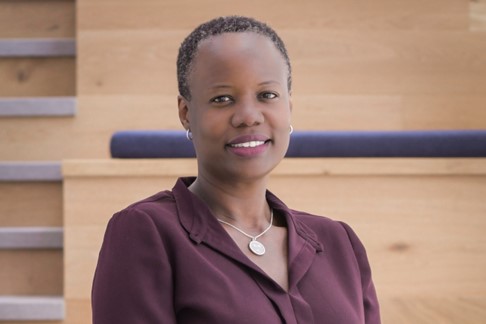Elena Richards, KPMG U.S. Chief Diversity, Equity, and Inclusion (DEI) Officer, brings extensive experience and a deep passion for creating inclusive workplaces to her job. With a career spanning over 25 years in professional services, Richards has been instrumental in driving DEI initiatives at KPMG since she joined the firm in 2020. Here we look at Richards’ background, her role at KPMG, and the strategies she employs to foster a diverse and inclusive culture.
Career Beginnings and Path to DEI
Richards’ professional journey began in the insurance industry, where she gained a lot of valuable experience dealing with customers.
“I began my professional journey in claims resolution within the insurance industry, where I recognized the value of understanding customer experiences,” Richards explains. “Subsequently, I gained valuable experience in recruiting at Inroads, an organization dedicated to creating access to opportunities for underrepresented youth in the corporate sector, leading to what has now been a successful 25-year career in professional services, with experiences in talent acquisition, talent management, resource management, and learning.”
Richards’ experience in both the insurance industry and at Inroads helped set the stage for her current role at KMPG.
Role at KPMG and DEI Strategy
As the Chief DEI Officer at KPMG U.S., Richards oversees a comprehensive DEI strategy that is deeply integrated into the firm’s business operations and culture. “My role began with a passion for creating inclusive environments where everyone can thrive, having served in various talent and people-focused roles at other firms before joining KPMG in 2020,” Richards notes. “I’ve always believed that diversity is not just a metric to strive for, but a value to embed into the fabric of an organization.”
One of the key initiatives under her leadership is the Accelerate 2025 strategy, aimed at growing and supporting a diverse workforce and inclusive work environment. This strategy emphasizes three key moments in the career lifecycle: Getting Here, Succeeding Here, and Leading Here.
“Everything we do at the firm is grounded in ethical decision-making and our firm’s values: integrity, excellence, courage, together, and for better,” Richards emphasizes.
Business Resource Groups
KPMG’s commitment to DEI is further demonstrated through its Business Resource Groups (BRGs), which have evolved from networking groups to integral components of the firm’s DEI strategy.
“Since the early 2000s, our firm has sustained and expanded Business Resource Groups to support our people’s sense of belonging, connection, and access to mentoring and professional development opportunities,” Richards explains. These groups have become an integral part of KPMG’s DEI strategy, she says, and they contribute significantly to the company’s ability to achieve its priorities. The groups include: Abilities in Motion, African Ancestry, Asian Pacific Islander, KPMG Network of Women, Pride@KPMG, Somos KPMG, and Veterans, among others.
This year, KPMG expanded its BRGs to include Interfaith, Middle East North Africa, and a pilot Jewish Ancestry group.
Unique DEI Initiatives
KPMG stands out in the DEI space with several unique initiatives, particularly in advancing women in the workforce. The KPMG Women’s Leadership Summit, celebrating its 10th anniversary in June 2024, is a notable event that brings together rising executive women for leadership development and networking. “One notable event that exemplifies this commitment is the KPMG Women’s Leadership Summit, which just celebrated its 10th anniversary in June 2024,” Richards highlights.
In addition, the KPMG Future Leaders Program, funded by the Summit and the KPMG Women’s PGA Championship, supports future generations of women leaders through college scholarships, mentoring, and leadership development. For instance, each year the net proceeds from the KPMG Women’s Leadership Summit and KPMG Women’s PGA Championship fund the KPMG Future Leaders Program, which supports future generations of women leaders through college scholarships, mentoring and leadership development.
Supporting Diverse Workers
To foster a diverse and inclusive workforce, KPMG launched the Self-ID initiative, allowing employees to voluntarily share various aspects of their identity. The data gained through self-identification, Richards says, has been instrumental in enhancing talent and leadership development programs, expanding the number of cultural holidays and observances that we celebrate as a firm, increasing available accommodations, enhancing our benefits, and informing our managing director and partner pipeline and succession planning processes, Richards says. The expanded categories include chronic illness, mental health, neurodiverse, physical mobility, sensory, LGBTQ+, and first-generation college or career professional.
Recruiting Diverse Talent
Richards also emphasizes the importance of recruiting diverse talent across various stages of career development. KPMG invests in talent from high school through college and beyond, hiring thousands of students each year for associate and internship opportunities across multiple disciplines.
“Our support for young professionals begins with the earliest stages of their KPMG journey, through talent attraction, early career pipeline investment, and a first-class onboarding experience for new joiners,” Richards notes.
KPMG also prioritizes the recruitment of experienced hires and senior talent, recognizing the strategic imperative of embracing a multigenerational workforce.
Creating an Inclusive Culture
KPMG promotes a diverse and inclusive culture through continuous learning opportunities and open dialogue.
“We have two symbiotic networks: our 10 BRGs and a Culture Champions Network that engages our people through connection, belonging, mentoring, and upskilling,” Richards explains. These networks play a significant role in shaping the firm’s future by encouraging colleagues to commit to KPMG values, including advocating for equality.
Moreover, KPMG’s annual Global Inclusion, Diversity, and Equity (IDE) Summit unites diverse communities and showcases progress, fostering an educated and empathetic workforce. “This year’s summit brought together colleagues from our member firms around the world to discuss key topics like intersectionality, acceptance, human-centered AI, and transparency,” Richards shares.
Elena Richards’ DEI leadership at KPMG underscores the firm’s commitment to fostering a diverse and inclusive workplace. Through strategic initiatives, employee resource groups, and a focus on continuous learning and open dialogue, Richards and KPMG are paving the way for a more inclusive corporate culture.
As business and HR leaders strive to enhance their DEI efforts, the insights and strategies shared by Richards offer valuable guidance for creating environments where everyone can thrive.
Lin Grensing-Pophal is a Contributing Editor at HR Daily Advisor.

